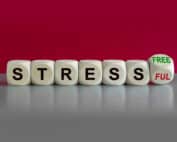During the winter, do you
- Feel down or depressed?
- Have less energy than usual?
- Feel less productive or creative?
- Need more sleep?
- Have less control over your appetite?
If you answered yes to more than one of these questions, The Psychiatric Times suggests you may have Seasonal Affective Disorder otherwise known as SAD.
SAD symptoms occur seasonally in the winter and last for 4-5 months and goes away in the spring. If it happens 2 years in a row and you don’t have a history of depression, you probably have SAD. Most patients report overeating, oversleeping and cravings. 1
These symptoms have a biologic basis!
It may be your hormones!
Cortisol production occurs when Corticotropin Releasing Hormone is made in the hypothalamus. CRH is regulated by blood levels of cortisol, light, the sleep wake cycle and stress.2 This signals the pituitary gland to make ACTH which signals the adrenal gland to make cortisol. These 3 signaling hormones are called the Hypothalamic Pituitary Axis (HPA).
Disruption of the Hypothalamic Pituitary Axis and high levels of cortisol have been linked to symptoms of depression. 3 Also a change in sex hormones, especially estrogen in women during premenstrual, pre and post pregnancy and menopause is also related to depression. This is why women are more prone to depression.4
Take charge of your hormones.
You can alleviate the symptoms of SAD
- Light therapy5
- Hormone balancing
- Managing cortisol
- Reducing stress
- Sleep
It is not as hard as you think.
What you eat, drink, how much you sleep and exercise, the toxins you are exposed to and the way you respond to stress all affects your hormones.
Here’s something to add to lifestyle, diet, sleep, exercise, getting light in the morning and balancing your hormones.
My favorite:
- Supplement to lower cortisol and depression is phosphatidylserine.6
- Technique to lower the stress response is Heartmath or deep belly breathing.
- Supplement for energy, relaxation and promoting calm is magnesium
There is so much you can do to get out of your funk and sail through the winter months. If you need more support, our DIY course The Cortisol Solution: The Key to Anti-Aging and Managing Mood, Energy, Weight, Sleep, & Immune System, is our most comprehensive course that will guide you to make the right choices to improve mood, energy, weight, sleep and your immune system during any season. Go from SAD to GLAD and reach out if you need more personal attetion!
- Rosenthal NE, Sack DA, Gillin JC, et al. Seasonal Affective Disorder: A Description of the Syndrome and Preliminary Findings With Light Therapy. Archives of General Psychiatry. 1984;41(1):72-80. doi:10.1001/archpsyc.1984.01790120076010
- Gamble KL, Berry R, Frank SJ, Young ME. Circadian Clock Control of Endocrine Factors. Nat Rev Endocrinol. 2014;10(8):466-475. doi:10.1038/nrendo.2014.78
- Holsboer F. The corticosteroid receptor hypothesis of depression. Neuropsychopharmacology. 2000;23(5):477-501. doi:10.1016/S0893-133X(00)00159-7
- Swaab DF, Bao AM, Lucassen PJ. The stress system in the human brain in depression and neurodegeneration. Ageing Res Rev. 2005;4(2):141-194. doi:10.1016/j.arr.2005.03.003
- Terman M, Terman JS. Light therapy for seasonal and nonseasonal depression: efficacy, protocol, safety, and side effects. CNS Spectr. 2005;10(8):647-663; quiz 672. doi:10.1017/s1092852900019611
- Komori T. The Effects of Phosphatidylserine and Omega-3 Fatty Acid-Containing Supplement on Late Life Depression. Ment Illn. 2015;7(1):5647. doi:10.4081/mi.2015.5647





She is a recognized and award-winning holistic, functional, integrative and anti-aging healthcare practitioner, speaker and author, and has been featured in ABC News, Forbes, WOR Radio and many media outlets to spread the word that you can live younger and healthier at any age.